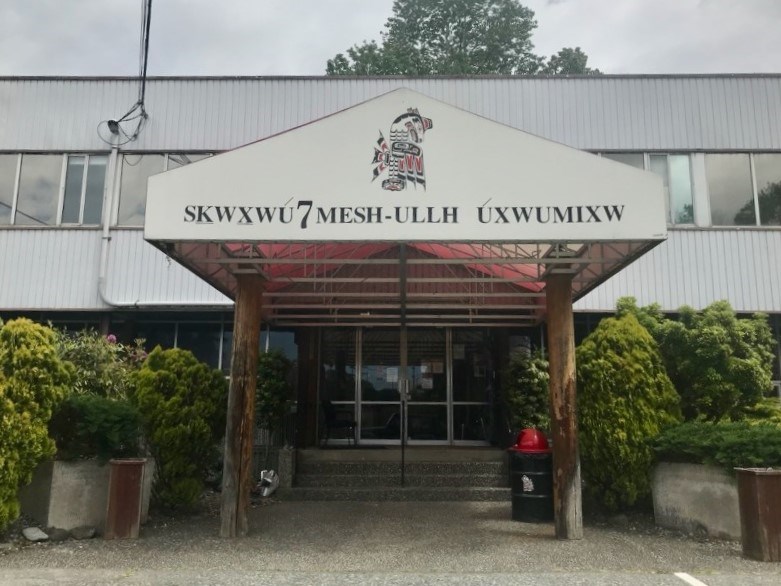The former chief operating officer of the Squamish Nation told a provincial court judge that he discovered a “shadow process” being used by former department head Krisandra Jacobs to have hundreds of cheques issued to her, adding up to millions of dollars over the course of a decade.
Walter Schneider, the former COO for the Squamish Nation, testified this week in North Vancouver provincial court where Krisandra Lenore Jacobs, 56, is on trial for allegedly defrauding the Squamish Nation out of close to $1 million between April 1, 2011 and May 2, 2014.
Jacobs has pleaded not guilty to charges of theft over $5,000 and fraud over $5,000.
Schneider, a chartered professional accountant and Squamish Nation member who lived off-reserve his whole life, described how after he was hired in 2013 he began a review of the nation’s accounts and noticed a large number of cheques being issued through the band manager’s emergency fund.
Schneider said he knew about other typical amounts paid from the fund, such as money for funeral expenses of Squamish Nation families and emergency help with food and rent payments.
“But then I started to see these other payments in there that no one mentioned, to Krisandra Jacobs and to Glen Newman. And that obviously raised a significant flag for me,” he testified.
Schneider said the amounts being paid to Jacobs and Newman were much higher than those being paid for other expenses.
When he searched for backup documentation, Schneider said, “Almost in all cases, it was just a one-page print off of an email from Krissy to finance, directly asking for that amount. And saying ‘approved by Glen.’”
When he asked Newman about it, Schneider said Newman deflected the question. “He said, ‘Well, Krissy handles all that.’ I don’t know if he was an unwitting kind of participant in that. It seemed like he wasn't aware of the magnitude of how many times Krisandra was getting cheques in her name, using his name as the approval.”
At the time of the alleged fraud, Jacobs was both elected co-chair of the nation and a department head in communications and the band manager’s office.
Schneider said when he started his job, “I found it very odd ... that we had an elected official who had access to a budget where other council members didn't have the same opportunity. I think it allowed for opportunities to curry favour with the community...”
Schneider said when he asked what the money was for, he was always told the details couldn’t be provided because the issues were confidential.
But Schneider said when he examined the amounts of money being requested and the frequency of those requests, and compared those to requests for financial help made by members through more regular channels, it didn’t add up.
Schneider said he eventually looked back through accounts dating back to 2003 and ran numbers he found through spreadsheets to “reverse engineer the financial statements.”
Although a detailed analysis only focused on one or two years, “if I look at the pattern, it was, you know, upwards of $8 million, the payments going to Krissy and Glen,” he said.
Schneider said he also noted Jacobs was using a number of different banks to cash the cheques.
When he asked questions about the band manager’s emergency fund to finance staff, it appeared to be “a very taboo topic,” said Schneider that staff would only whisper about behind closed doors. “I found that strange behaviour that I kind of took note of,” he said.
Eventually Schneider outlined some of his concerns to councillors Carla George, Deborah Baker and Julie Baker, who supported him in bringing those issues to the full Squamish Nation council.
The reaction of council was “very divided,” said Schneider.
Council eventually endorsed a plan to have an independent investigation conducted by a third-party lawyer Nazeer Mitha. After that, Jacobs and Newman were stripped of their authority to request payments, he said.
Schneider said the result was, the budget for the band manager’s emergency fund fell from about $3 million annually to about $1.75 million annually. “The major difference was Glen and Krissy’s cheques,” he said. “We had a significant reduction in the number of payments.”
In cross-examination, Jacobs’ lawyer John Turner suggested the reason Schneider began investigating Jacobs was that Carla George had come to him with rumours that Jacobs had been seen gambling with $100 bills in her hand. “It formed part of the equation, but it wasn’t the driving force,” said Schneider.
Turner also put to Schneider that the Squamish Nation council was aware of cheques being issued for cash, in addition to formal applications for assistance. “My understanding is they weren’t aware there was this other process happening,” said Schneider. “My understanding is they weren’t aware of it at all.”
Earlier in the week, Newman testified that he and Jacobs worked long hours in the band manager’s department – often logging 10- to 16-hour days and dealing with the most complicated social and financial hardship cases among band members. Newman said he took responsibility for not being more involved with administration of the department. “I didn’t query too much because [Jacobs] was responsible. And I trusted her,” he said.
Crown prosecutor Shelley Hulko has finished calling witnesses and Turner said he does not intend to call any witnesses for the defence. Lawyers will present their closing arguments in the trial later in March.



